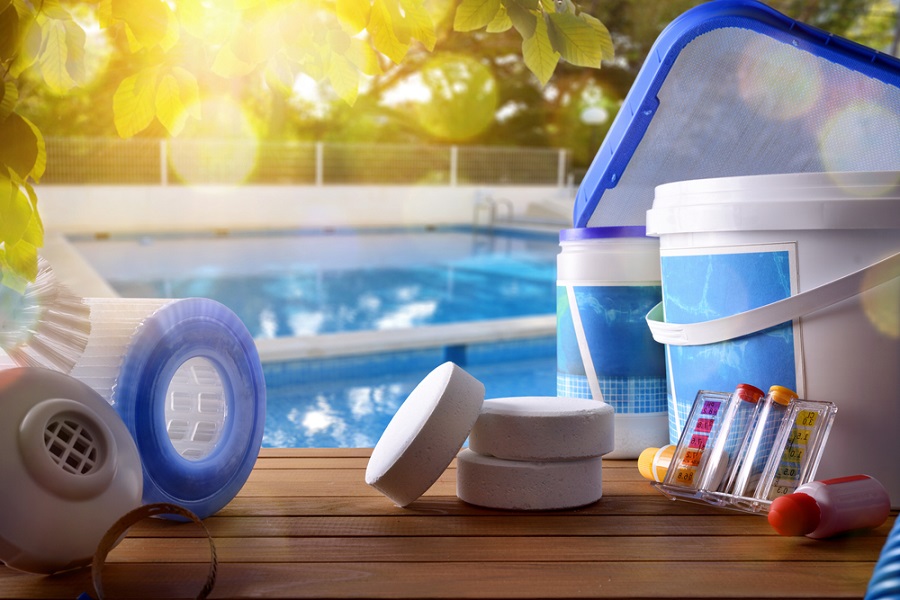A swimming pool is a fantastic place to spend a relaxing weekend. But maintaining a pool takes a lot of effort and money. So if you don’t do it right, you may spend a lot of money fixing problems that you didn’t expect.
In this article, we will show you how to maintain your pool correctly to enjoy the benefits of having one without any hassle.
Weekly Pool Maintenance
1. Check the water level in the pool.
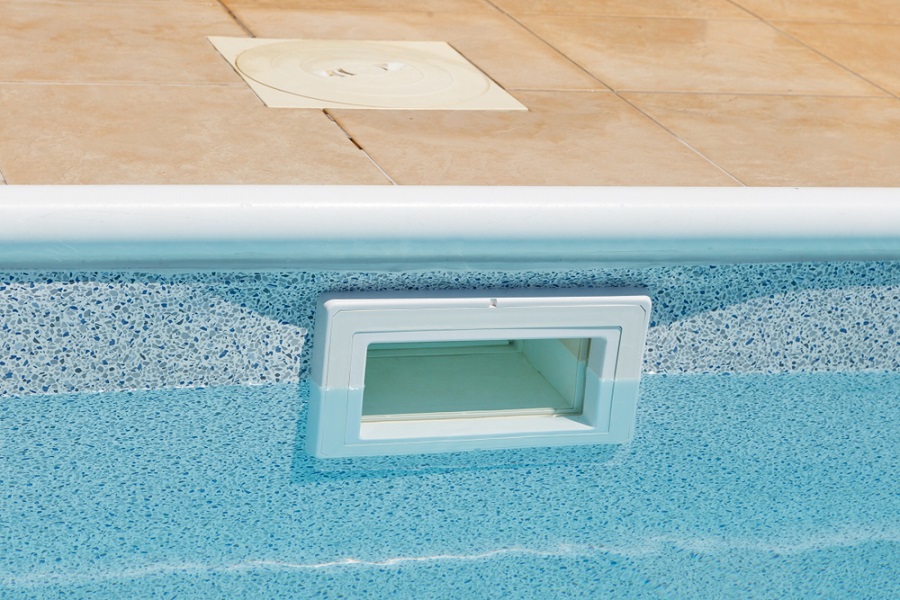
It’s essential to check the water level at least once per week. In addition, the water level should be checked every time before using the pool.
This way, you’ll know if there are leaks or other issues with the plumbing system. It’s also a good idea to have a professional come out and give you a free estimate on what needs to be done to fix the problem.
2. Clean the filter
The filter is responsible for removing dirt from the water. When the filter is clogged up, the water becomes dirty and cloudy. This makes the pool look unappealing and affects its performance.
So make sure to clean the filter regularly. There are several different ways to clean the filter. You can use a vacuum cleaner, a power washer, or even a simple garden hose to remove debris.
3. Skim Off Leaves and Debris
If you notice leaves floating around the pool, they need to be removed immediately. They could cause severe damage to the pool liner, so you would have to replace it.
Also, if you see any debris floating around the pool, such as toys, bottles, etc., you need to get rid of them right away.
4. Brush Sediment from Pool Walls
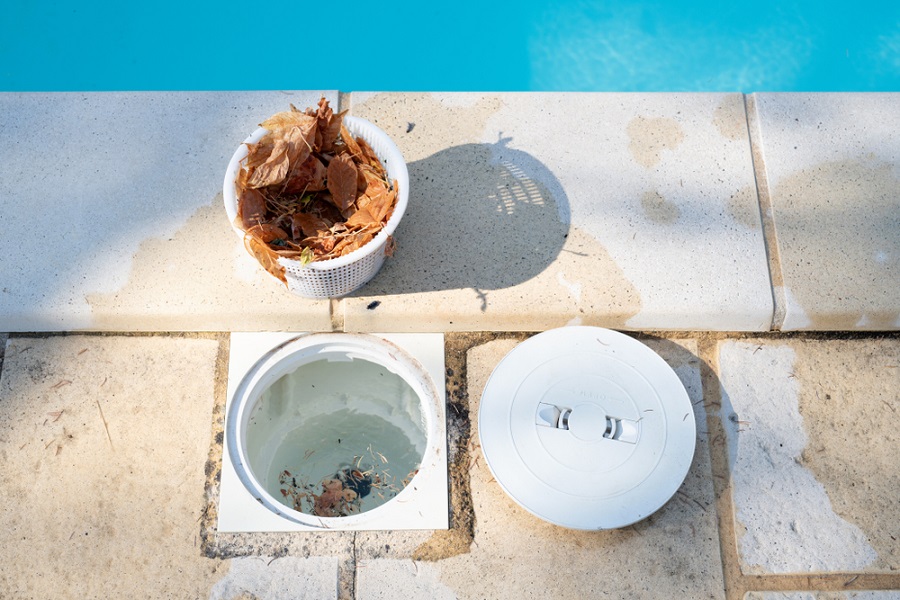
Sediment is hard particles that accumulate overtime on the bottom of the pool. Over time, these particles build up and block the skimmer and drain.
When this happens, it causes the water to become murky and dirty. Brushing off sediment helps prevent this issue from happening. Make sure to brush the sides of the pool walls thoroughly.
5. Vacuum the Pool
Vacuuming the pool is another excellent task that you shouldn’t ignore. Not only does vacuuming help keep the pool looking nice, but it also removes all kinds of debris from the surface of the water.
Most pools today have some automatic self-vacuuming mechanism. However, if yours doesn’t, you need to hire someone to do it for you.
6. Clean Skimmer
The skimmer is the part of the pool that collects debris from the water. As the name suggests, it has a basket inside where debris falls into. After a while, the basket gets full and needs to be emptied.
When this happens, you’ll need to empty the basket by hand. You can either use a net or a scoop to collect the debris.
7. Check Filter and Backwash As Needed
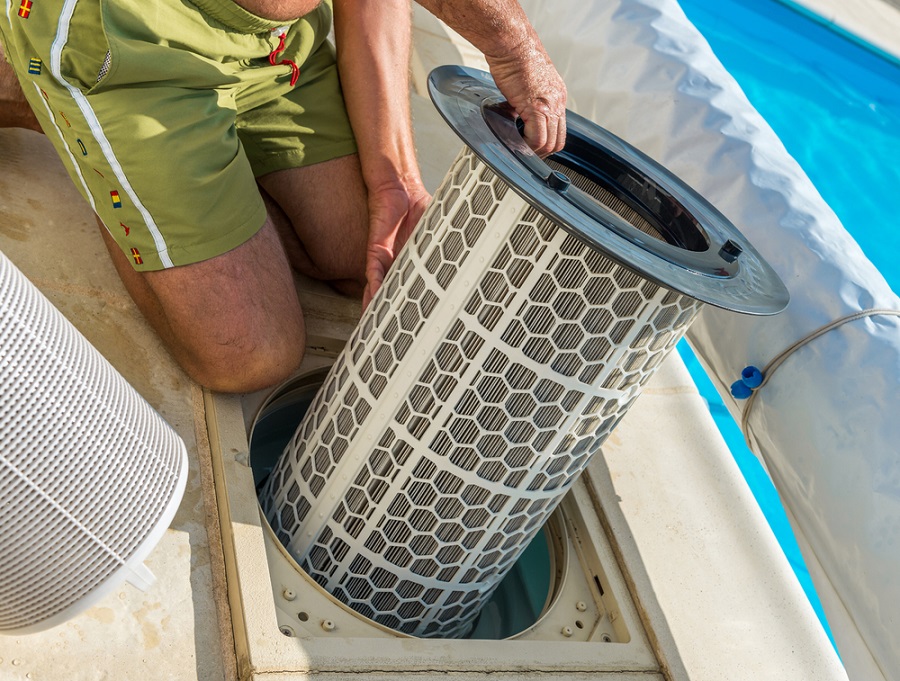
One of the essential parts of keeping a pool running smoothly is checking the filter and backwashing it. Filters trap dirt and debris from entering the pool.
When the filter gets clogged up, it stops trapping dirt and debris and causes the water to become dirty. If you don’t clean your filter regularly, it will eventually stop working properly.
8. Keep Your Pump Running
You pump water through your pool to circulate it. If you leave your pump unattended for too long, it may start overheating.
In addition, if you forget to turn off the pump when you’re finished using the pool, it might drain itself dry. Therefore, it’s essential to remember to shut down the pump after each use.
Steps To Clean The Pool Filter
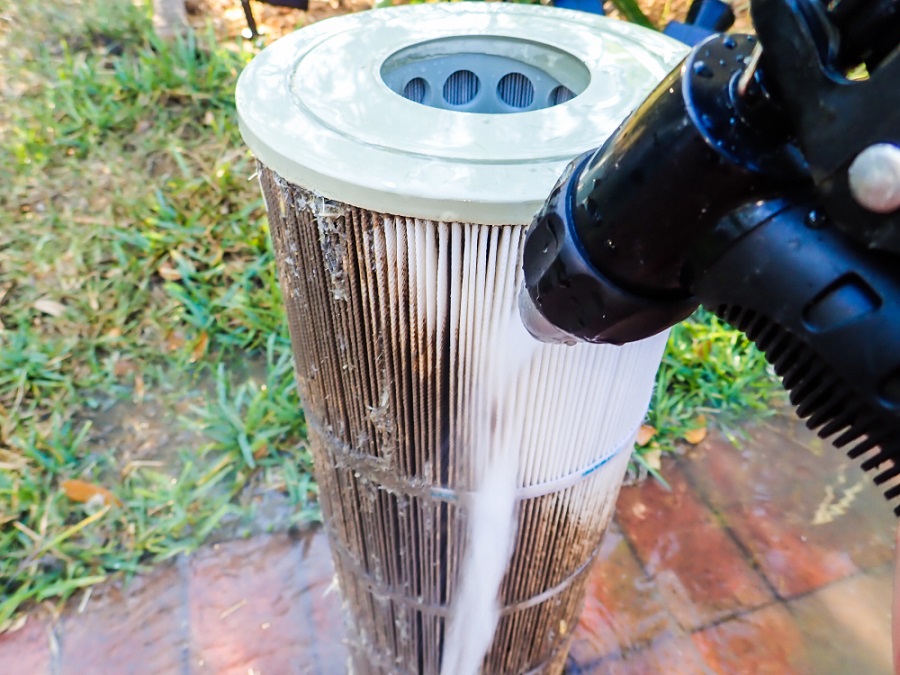
1. Remove the Cover
First, you need to remove the cover from the pool. Next, you need to take out the filter cartridge. It should be easy to find since it usually sticks out of the top of the pool.
2. Disconnect the Power Supply
After taking out the filter cartridge, disconnect the power supply. You can do this by turning off the switch near the wall socket.
3. Drain Water From The Pool
Next, you need to drain the water from the pool. This can be done by opening the valve at the pipe’s end leading to the filter.
4. Empty the Filter Cartridge
Once the water is drained from the pool, you need to empty the filter cartridge. You can do this easily by lifting the lid from the side of the pool.
5. Replace the Filter Cartridge
Once the filter cartridge is empty, you need to put it back in place. You can do this simply by pushing it back into its original position.
6. Turn On the Power Supply
Finally, you need to turn on the power supply. You should now be able to see whether the filter is usually working.
Benefits of Keeping the Pool Running
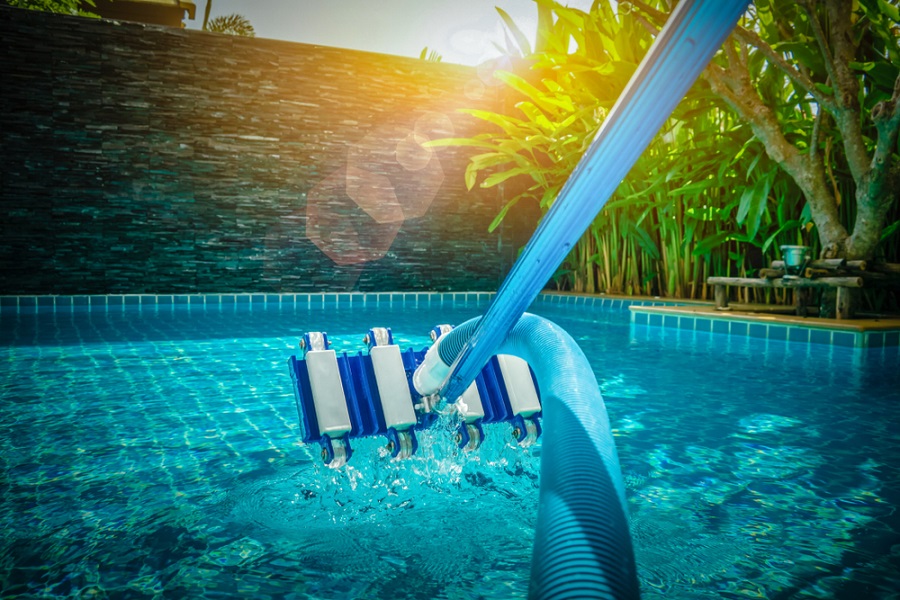
If you want to know more about maintaining a pool, here are some benefits of keeping the pool running.
1. Reduces Chlorine Buildup
Chlorine buildup occurs when there isn’t enough chlorine in the water. Chlorine helps kill bacteria, which makes the water safe for swimming.
Over time, however, the amount of chlorine in the water starts to decrease. Eventually, the chlorine level drops so low that the water becomes unsafe for swimming.
2. Removes Bacteria
Bacteria build up in the pool over time. They cause unpleasant odors and stains on the walls of the pool. Thus, they make the water unhealthy. Regular cleaning removes these bacteria from the pool.
3. Makes Swimming Safe
Swimming pools provide an excellent environment for children to play. However, they also attract insects such as mosquitoes. These insects carry diseases like the West Nile virus.
By maintaining the pool, you ensure that no one has access to the pool.
4. Improves Water Quality
The water quality improves because the pool filters out all kinds of impurities. For instance, it removes algae from the pool.
Algae blooms occur when there aren’t enough nutrients in the water. As a result, the water becomes cloudy.
5. Helps Prevent Flooding
Flooding happens when the water level rises above the rim of the pool. When this happens, the water spills over the sides of the pool.
Flooding causes damage to the pool and sometimes even leads to injury or death. If you want to prevent flooding, you have to keep the pool clean.
Few More Tips
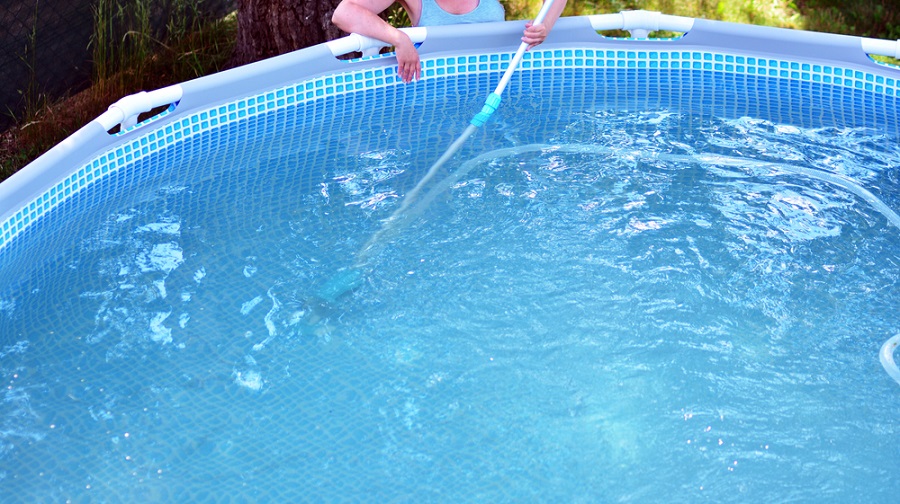
- Use a good quality pool filter. It should last at least five years before needing replacement.
- Regularly check the filters and clean them with a mild detergent solution.
- Avoid leaving the pool unattended for extended periods.
- Do not allow children to play near the pool.
- Never swim without wearing goggles.
- Make sure to maintain the pool filter regularly.
- Always read the manual before operating the equipment.
- Never take the cover off the pool.
- Keep the pool clear of weeds and other plants.
- Don't let pets swim in the pool.
- Check the temperature of the water every day.
Pool Maintenance Cost
Pool maintenance costs $100-$200 per year, depending on how often you perform specific tasks. For example, cleaning out the filter usually costs between $50 and $100, whereas replacing a broken skimmer can cost $300 and $500.
FAQs
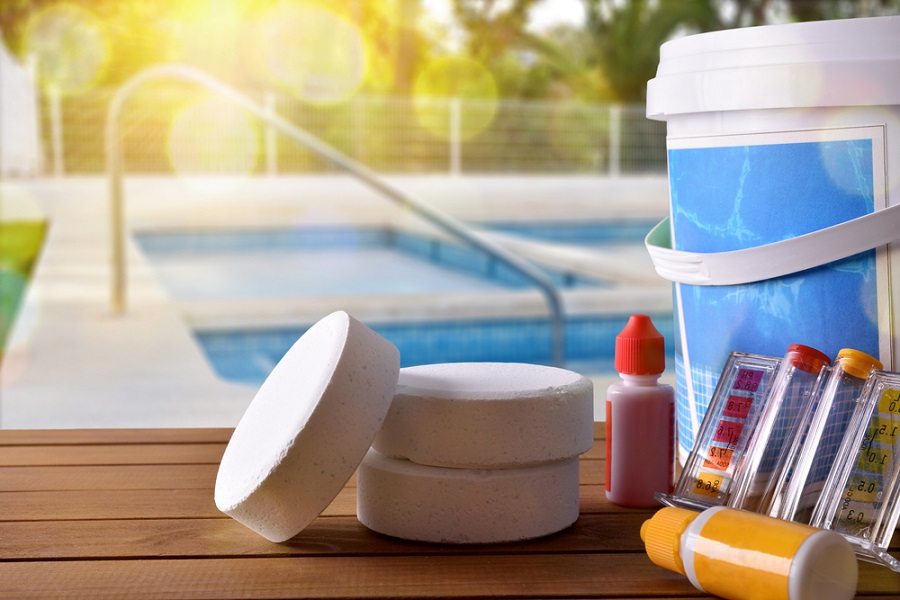
Q: What are the best chemicals to use?
A: The best way to find out what type of chemical you need is to contact your local pool store.
Q: How often should I change my pool filter?
A: Every month is recommended.
Q: Is there anything else I need to know about maintaining a swimming pool?
A: Yes! There are many things you need to consider when maintaining a pool. For example, you need to ensure that the pool is safe for your family members. Also, you need to ensure that you follow the instructions provided by the manufacturer.
Q: Why do we need to keep our pool clean?
A: Cleaning the pool keeps it free of dirt and debris. Dirt attracts pests like mosquitos, which spread disease. Moreover, dirty pool water may lead to health problems for swimmers.
Q: How much does it cost to maintain a pool?
A: The price depends on the size of the pool, its location, and the number of people using it.
Q: Should I buy a new pool instead of repairing an old one?
A: Repairs are cheaper than buying a new pool. In addition, repairs will save you time and money.
Q: What if I don’t have any experience? Can I still learn how to maintain a pool?
A: Of course! Just ask someone who has done it before. They might be willing to share their knowledge with you.
Q: Will I get hurt if I touch the pool walls?
A: Swimming pools contain sharp edges and corners. So, you must wear protective gear such as goggles and gloves while working around the pool.
Q: Do I need special training to work in a swimming pool?
A: No. However, you should be aware of safety precautions.

